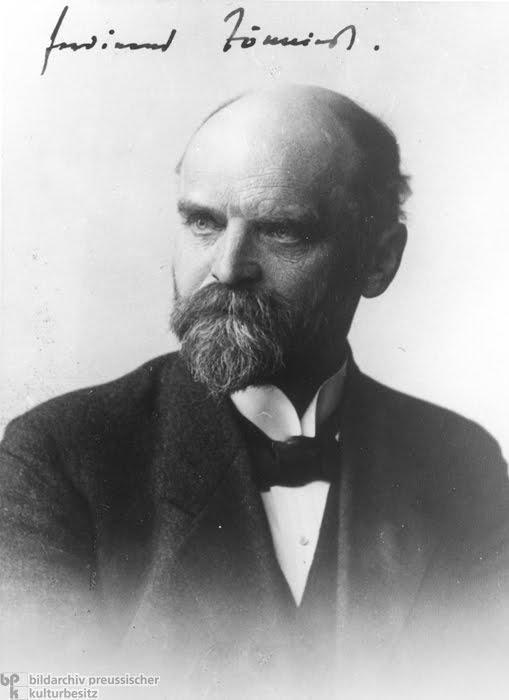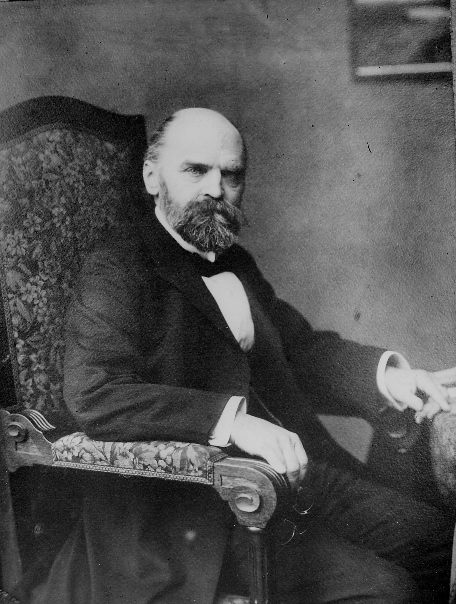<Back to Index>
- Sociologist Ferdinand Tönnies, 1855
- Writer Aldous Leonard Huxley, 1894
- 1st Prime Minister of Ukrainian People's Republic Volodymyr Kyrylovych Vynnychenko, 1880
PAGE SPONSOR


Ferdinand Tönnies (26 July 1855, near Oldenswort (Eiderstedt, North Frisia) - 9 April 1936, Kiel, Germany) was a German sociologist. He was a major contributor to sociological theory and field studies, best known for his distinction between two types of social groups, Gemeinschaft and Gesellschaft. He was also a prolific writer and co-founder of the German Society for Sociology (being its president 1909 - 1933, when he was ousted by the Nazis).
Ferdinand Tönnies was born into a wealthy farmer's family in Nordfriesland in Schleswig - Holstein, then under Danish rule. He studied at the universities of Jena, Bonn, Leipzig, Berlin, and Tübingen. He received a doctorate in Tübingen in 1877 (with a Latin thesis on the ancient Siwa Oasis). Four years later he became a private lecturer at the University of Kiel. Because he had sympathized with the Hamburg dockers' strike of 1896, the conservative Prussian government considered him to be a social democrat, and Tönnies was not called to a professorial chair until 1913. He held this post at the university of Kiel for only three years. He returned to the university as a professor emeritus in 1921 and taught until 1933 when he was ousted by the Nazis, due to his earlier publications that criticized them.
Tönnies, the first German sociologist proper, published
over 900 works and contributed to many areas of sociology and
philosophy. Many of his writings on sociological theories — including Gemeinschaft und Gesellschaft (1887) — furthered pure sociology. He coined the term Voluntarism. Tönnies also contributed to the study of social change, particularly on public opinion, customs and technology, crime, and suicide. He also had a vivid interest in methodology, especially statistics, and sociological research, inventing his own technique of statistical association. Tönnies distinguished between two types of social groupings. Gemeinschaft — often translated as community (or
left untranslated) — refers to groupings based on feelings of
togetherness and on mutual bonds, which are felt as a goal to be kept up, their members being means for this goal. Gesellschaft — often translated as society — on the other hand, refers to groups that are sustained by it being instrumental for their members' individual aims and goals. Gemeinschaft may be exemplified historically by a family or a neighborhood in a pre-modern (rural) society; Gesellschaft by a joint - stock company or a state in a modern society, i.e. the society when Tönnies lived. Gesellschaft relationships arose in an urban and capitalist setting, characterized by individualism and
impersonal monetary connections between people. Social ties were often
instrumental and superficial, with self interest and exploitation
increasingly the norm. Examples are corporations, states, or voluntary associations. His
distinction between social groupings is based on the assumption that
there are only two basic forms of an actor's will, to approve of other
men. (For Tönnies, such an approval is by no means self-evident,
he is quite influenced by Thomas Hobbes). Following his "essential will" ("Wesenwille"), an actor will see himself as a means to serve the goals of social grouping; very often it is an underlying, subconscious force. Groupings formed around an essential will are called a Gemeinschaft. The other will is the "arbitrary will" ("Kürwille"):
An actor sees a social grouping as a means to further his individual
goals; so it is purposive and future - oriented. Groupings around the
latter are called Gesellschaft. Whereas the membership in a Gemeinschaft is self - fulfilling, a Gesellschaft is instrumental for its members. In pure sociology — theoretically —, these two normal types of will are to be strictly separated; in applied sociology — empirically — they are always mixed. Tönnies’ distinction between Gemeinschaft and Gesellschaft,
like others between tradition and modernity, has been criticized for
over - generalizing differences between societies, and implying that all
societies were following a similar evolutionary path, which he has
never proclaimed.
